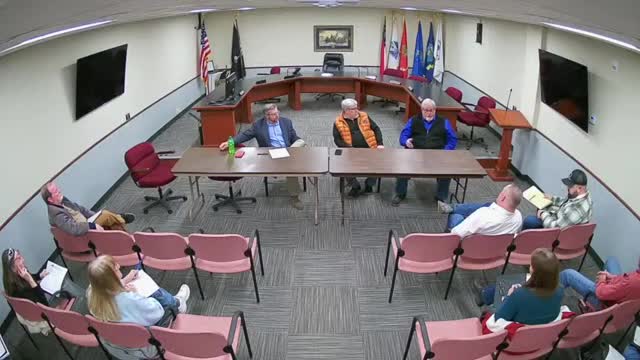Madison County officials outline risks and deadlines from House Bill 581; opt-out decision due March 1
Get AI-powered insights, summaries, and transcripts
Subscribe
Summary
County tax staff and appraisers warned that House Bill 581's floating-homestead provisions could shrink revenues, push millage rates higher and require local governments to decide whether to opt out by March 1; staff said state guidance remains incomplete.
Madison County officials and appraisal staff held a special call to review House Bill 581, the state measure that changes how homestead exemptions and annual adjustments are applied. Presenters warned the measure could cause sizable, compounding revenue losses for counties and school systems, force millage-rate increases and leave local governments with hard choices ahead of a March 1 opt-out deadline.
The meeting included presentations from Madison County Tax Commissioner Lamar Dalton, appraisers Robin Baker and Gary Cavalier, and Shane Higgs, chief appraiser from Hart County. County staff summarized modeling that used 2021 as a base year and projected revenue declines for county and school tax bases in successive years. Those exercises estimated combined county-and-school losses on the order of $2 million in 2022, about $5 million in 2023 and roughly $7 million in 2024, according to the presenters. The simulations indicated that the county portion alone would have required millage-rate increases of about 6.5% in the first year, 16.7% in the second year and roughly 20.8% in the third year to maintain current service levels.
Officials said the legislation freezes a property’s ‘‘base year’’ value for homestead taxpayers while allowing annual CPI-based adjustments set by the state. Presenters and attendees expressed concern that the Department of Revenue has not yet issued implementing rules or the CPI method and timeline counties will use. That uncertainty complicates budget schedules: some counties operate on July-to-June fiscal years and must adopt budgets before the state issues any CPI guidance, the presenters said.
Staff described implementation mechanics counties are already being told to follow if they choose to opt out. Cities and counties that wish to opt out must hold three public hearings (one of them between 6 and 7 p.m.), publish a legal advertisement (presenters said the ad must meet a 30-square-inch requirement) and adopt and file a resolution with the Secretary of State by March 1. County staff said counties might prefer to hand-deliver opt-out resolutions and photograph the delivery because of recent postal delays.
Speakers emphasized distributional effects: about 7,200 parcels in the county were described as ‘‘partials’’ out of roughly 17,600 total parcels, meaning many taxpayers who currently receive partial relief could see the remainder of the tax burden shifted onto other property owners as millage rates rise. Appraisers warned that farmers and owners on conservation-use programs (so-called CUBAs or CUBA) could be affected because acreage and conservation valuations also would be subject to the annual CPI adjustments the state sets.
Multiple rural counties were cited as considering or already announcing opt-outs, including cited examples of Hall, Hart and Franklin counties; speakers cautioned that county circumstances vary widely and that a county with greater commercial or industrial tax base will feel this change differently than a largely residential and agricultural county such as Madison. Presenters also noted particular complications where cities cross county lines: if one jurisdiction that overlaps a city opts out while another opts in, it may disqualify the county from collecting the floating-homestead levy for the overlapping parcel, and state guidance on that scenario remains unclear.
Attendees and presenters repeatedly stressed public confusion. Presenters said many voters had believed the law ‘‘froze’’ overall tax bills; staff clarified that the bill freezes a base assessed value for homestead taxpayers while millage-rate changes and the state CPI adjustment can still raise taxes. Several presenters suggested local governments run focused public-education outreach — including posting the ACCG/GAAO explanatory slide deck referenced during the meeting — before any final local decision.
No formal county decision to opt in or out was recorded during the call. County staff said they would publish the legal advertisement and circulate sample resolutions and deadlines to the cities and towns in the county. The meeting concluded with a procedural motion to adjourn that was seconded; the transcript does not record a roll-call vote on the adjournment.
Votes at a glance: Motion to adjourn — motion seconded; no roll-call vote recorded in the transcript.
Why this matters: Presenters said the bill is permanent for opted-in taxpayers and compounds over time; county modeling shows multi-million-dollar revenue shortfalls possible within a few years, which could force millage-rate increases or cuts to services. The March 1 deadline and limited state implementation guidance make the coming weeks a critical period for county and municipal officials to choose whether to opt out and to begin public education efforts.
